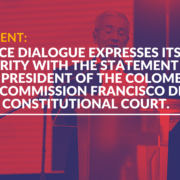According to Father de Roux, the mandate of the Commission needs to be extended by a period of seven months. This is due to the ongoing pandemic, which has caused a series of logistical problems that have hindered the gathering of first-hand testimonies, the submission of reports to the Commission, the participation of victims’ organisations and the occurrence of dialogues with actors in the conflict, amongst other activities. This opinion on extending the mandate is shared by victims’ organisations.
The Colombian Presidency’s response to the petition, sent to the Constitutional Court, proposed that agreeing to such an extension is a decision for the Colombian Congress. Additionally, it suggested that the extension is not required as the Commission has already had a ‘more than reasonable’ period of time to carry out its mission. If the extension were to be granted, the government asked why other State institutions should not receive a similar extension, including those for public elections, as every institution has been affected by the pandemic.
Embrace Dialogue supports the Truth Commission’s statement on the basis of three arguments:
- The decision about whether to extend the mandate of the Truth Commission should not be taken by a political body such as the Colombian Congress, considering that the mission of the Commission to uncover the truth is seen as threatening by various political and economic sectors represented in Congress. This includes those who have opposed the mandate of the Institutions of the Comprehensive System for Peace, from the very beginning.
- It is important to remember the temporary and particular nature of the Truth Commission. The Commission is not a regular State institution, and its role has been established in the context of an extraordinary need in this moment of Colombia’s history. By law, the Commission has three years to fulfil its mandate and it is key to ensure this timeframe corresponds to actual time that can be used effectively to fully carry out its duties. With that in mind, the Commission should be treated differently.
- The vast majority of the victims of Colombia’s conflict are members of vulnerable rural communities. As a result, adequate provision of internet connectivity and health facilities for these people does not exist. For more than a year, the Truth Commission has made huge efforts to collect and process information whilst following the emergency health restrictions declared by the national government due to the pandemic. Inevitably, this has led to severe delays in the Commission’s work schedule.
We trust that the Constitutional Court will extend the time mandate of the Commission given the constitutional parameters that guarantee the right to participation of rural communities and victims of the armed conflict, both with respect to contributions to the final report as well as to the pedagogical process of social appropriation of the truth.




Leave a Reply
Want to join the discussion?Feel free to contribute!